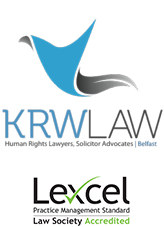SECRET EVIDENCE IN LEGACY CASES: THE MURDER OF EOIN MORLEY
KRW LAW LLP is instructed by Eilish Morley on behalf of her son Eoin Morley.
Eoin Morley was murdered on 15th April 1990 in Newry. For 30 years his family have been seeking the truth about his death and the role of collusion between state agencies and agents and paramilitary groups, specifically the agent/informant Peter Keeley.
Eilish Morley is the Plaintiff in a civil action she has bought against the MOD, Peter Keeley, the PSNI and OPONI. At the core of this action is a request for the discovery and disclosure held by the Defendants.
Eilish Morley is seeking damages against the MOD for either allegedly permitting the murder to take place or failing to take steps to prevent it.
She also claims the RUC failed to carry out a proper investigation into the shooting, and that Special Branch officers withheld intelligence. The RUC investigation was subject to an OPONI review.
This civil action is subject to the controversial Closed Material Procedures (CMP). This process excludes the Plaintiff from accessing evidence but allows a court to examine and rule on its significance in secret. CMP was introduced to address sensitive information in contemporary counter-terrorism cases in the UK. CMP was not intended to apply to Conflict-related Legacy litigation in Northern Ireland. CMP has been used more frequently in this jurisdiction than anywhere else in the UK.
KRW LAW LLP went before a High Court judge to appeal an initial refusal of their attempt to secure third-party discovery of documents held by OPONI following its investigation of the RUC to ensure the fair and effective administration of justice. Today in the High Court Mr Justice Horner ruled on the following points:
That evidence relevant to the proceedings – that requested by Eilish Morley from OPONI – is admissible no mattter how it is obtained and that there is a strong public interest in the court having all material before it so that it can deal with a claim justly. He ruled further that it will be be for the trial judge to decide whether the balance favours admitting the documents in evidence. Finally, excluding evidence could reflect the disapproval of the Court in costs.
This judgment is important for three main reasons: firstly, it reiterates the importance of having all relevant evidence, no matter how sensitive, before a court. This is especially important in Legacy cases given the sensitive nature of a lot of these cases. Secondly, it provides certainty for lawyers and clients in charting a path forward for sensitive evidence to be handled responsibly and lawfully. Finally, it makes clear the need for cooperation by the State in ensuring that a court has all relevant evidence before it.



